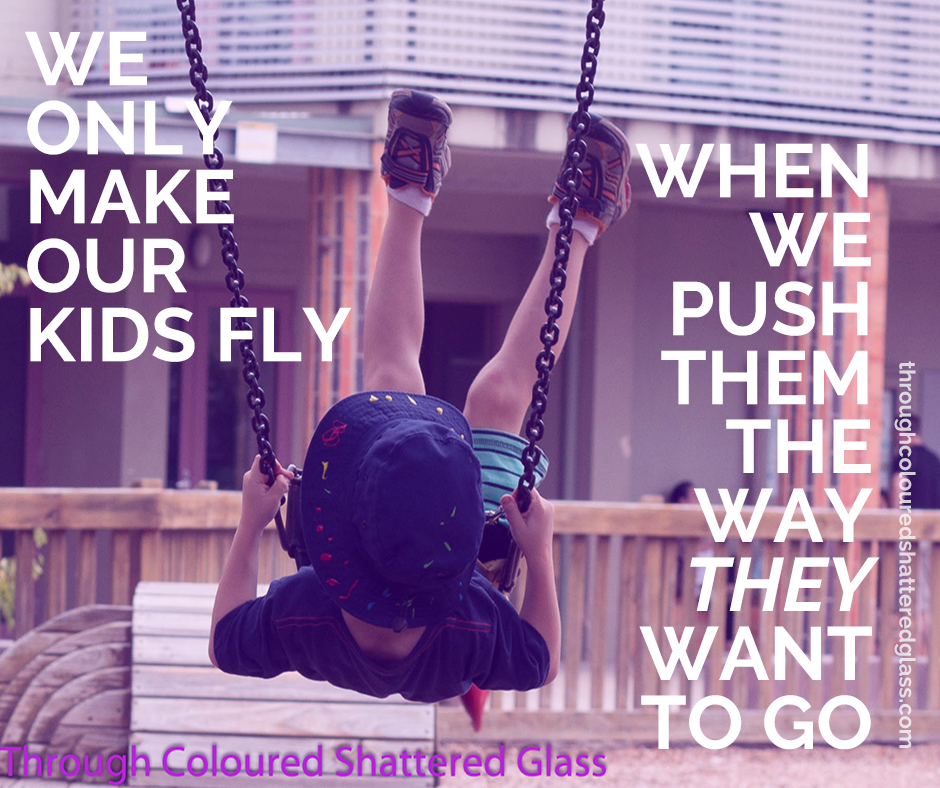There are certain things afforded a parent of a special needs child. Mostly with expectation. Something I even noticed as a child was the lack of pressure and expectations that were imposed on me. On the other hand, I was encouraged to do what I loved, in spite of its predicted financial future.
Taz has been afforded a similar lack of expectation, but even better, as a child on the Autism Spectrum, he has great strength and focus for things he is passionate about. In the environment of his obsession, he has the strength to become expert because of how driven he is by it. It’s becoming a successful focus now, to encourage the passions/obsessions of those on the Autism Spectrum. So I ask: why can’t we do something similar for all children?
As the world evolves, the humans within can afford to specialise more and more. We no longer need mindless hoards to do much of the work, as machines continue to be more cost effective for this. While schooling still lags at recognising this in Australia, other countries, like Finland, have caught on, and begun to support children in finding their niches. Worldwide, the advantage of the Autistic mind is also seeing an increase in acceptance for specialisation, so let’s follow our human evolutionists and apply this to ALL children.
How many times have you heard parents (and others) describe children in negative ways, citing their predisposition to being “over dramatic” or “talking too much”, or even “wasting so much time” doing particular activities that appear to be less lucrative. If we saw them in more positive terms as “fabulous actors”, “potential public speakers”, or even “future experts in collectable comics”, then we might be more inclined to encourage their passions.
As we live in a world where a bottle collector can build an entire house from their collection, a child can collect cow pads and sell them to tourists as “Fair Dinkum Aussie
bullsh*t” and children can begin lucrative charity programs, it’s becoming more and more possible for everyone to find their niche.
Each person is not only a sum of their experiences and knowledge, but they also benefit from what drives them. Of course, it can take some encouragement to continue their learning when they meet obstacles, and practice is a learned skill that warrants demonstration by example and experience, but if we begin by developing an interest that already exists, we can access niche success, as well as plenty of bonus learning along the way.
Learning football statistics enhances memory. Learning video games can enhance concentration and peripheral vision. Following ones passion also encourage self-directed learning. All of these skills can be applied to school work, and later in life to work also. So in many ways it doesn’t matter as much what their interest is, but how they interact with it.
Dale has great application when learning about animals, insects and birds. He delights in watching documentaries, and reading books about the different characteristics. He also loves learning Mandarin. He has great concentration, memory and pronunciation. Encouraging learning in these areas isn’t difficult. It’s worth taking hold of his inner passion and building on it. I can do that by suggesting documentaries, and watching some with him. Also by teaching him what I know about different languages, plus giving him access to apps and CDs which teach languages. I also applied his interests in football, jokes and spooky stories to help him improve his reading. As a child who can be difficult to motivate, this has served him well.
Chip has an ongoing passion for football. He not only loves to play, but to watch and learn, plus memorising team members, their statistics and understanding their play style. He is also a talented flautist. I encourage his interest in football, giving him access to games he can watch, plus player info. and statistics. I’m confident that he puts full energy into all that he does, so tend to let him run his own free time, encouraging the learning he does. I also don’t pressure him with expectations, because he does enough of that himself. He has evolved to understand the value of teamwork, even transferring that understanding to the teamwork involved in running a family. His time learning flute has also allowed him to overcome obstacles that seemed so big to begin with, and while he’s encouraged to perform, he has never been forced. This is working to help him with his fear of being the focus of attention.
Taz has ALWAYS loved trains. He knows different models of them, knows our local network, and enjoys time at a model train club, where others who love trains gather. Not only does this develop his social interaction, as his knowledge of the systems has also, but it makes him the transport contact of our friends and family community. He feels useful, advising people who where to take which train etc. He has also got a focus wherever he is. His memory, organisational skills, planning skills, recognition and research skills are all enhanced by this interest. He has recently applied these skills to study something completely unrelated to trains at school. He also frequently designs new games, solutions to problems, and likes to organise things. Sometimes this means I need to be understanding when he re-organises a pantry shelf, while his room looks like a bombsite. He also spends much of his time distracted, as I’m sure many of history’s greatest scientists did. I have however, enjoyed his ability to navigate public transport systems, benefitted from his cooking abilities, and watched him come up with some valuable solutions to everyday issues. He began to enjoy cooking, when he was quite young. We have openly supported this, even allowing independence and exploration as he does. I might spend LOTS of time cleaning up after he cooks, or getting him to gather mess left from his latest game design, or even had to be flexible about when he does his chores to allow him to continue when he’s in “the zone”. Just allowing him the ability to explore, to experience, to make mistakes and mess has benefitted him so much.
It’s been suitably easy to enhance his skills by asking for him to plan and cook a new meal too. He also plays more with his brothers when he designs a new game. Even encouraging him to expand his public transport knowledge to buses, trams and planes has been welcomed and embraced. Like a river flowing fast, it’s so much easier to swim in the direction that it’s flowing. That’s why pushing him out of his comfort zone within his niche has proven to be easy for both myself and him.
Next time your child takes up a hobby you don’t necessarily see in a positive light, think about how it can assist them with any difficulties they have. There’s so much you can achieve by using the flow of their latest river of interest. Harness what they love, and go along for the ride. You never know where they might end up.
If you had been allowed to do what you wanted as a kid, do you think you would’ve done something different?
What does your child LOVE to do?




